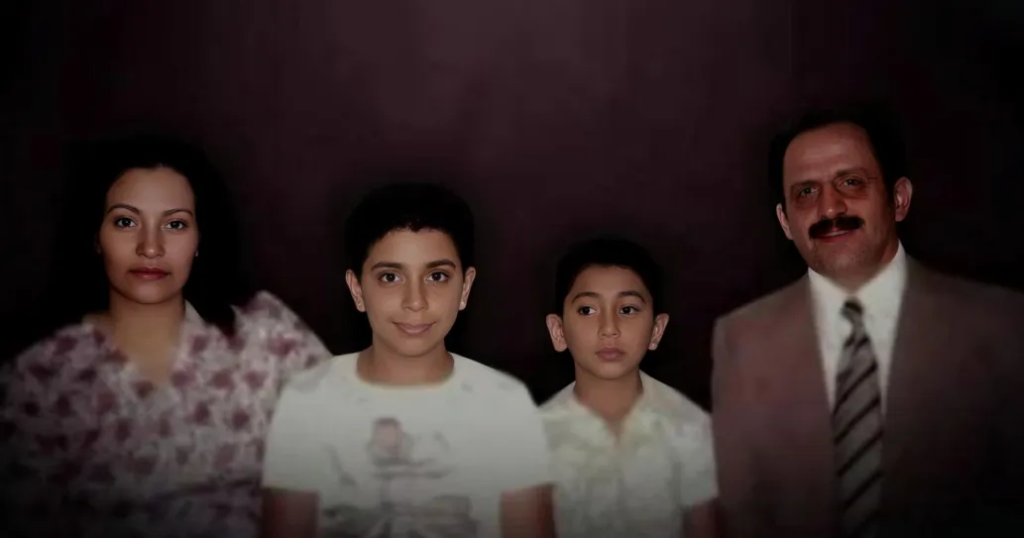Source: iranwire.com
Translation by Iran Press Watch

Keyvan Rahimian, the Baha’i translator and psychologist who is currently serving his sentence in Evin Prison, has written a letter to his martyred father, Rahim Rahimian, on his birthday. Keyvan’s father, along with two other Baha’is, were executed in Tehran in April 1984 after enduring severe torture. Their only crime was their belief in the Baha’i Faith. Authorities did not return Mr. Rahimian’s body to his family and buried him in an unknown location in Khavaran Cemetery.
In September 2011, Keyvan Rahimian was summoned and arrested for teaching psychology to the deprived Baha’i youth of higher education. He spent a week in detention before being released on bail. The Revolutionary Court in Tehran sentenced him to five years in prison. His sentence began in October 2012 at Evin Prison, only a few months after the passing of his dear wife due to illness, and he had to leave their 12-year-old daughter, Zhina, under the care of his mother, Afagh.
During Keyvan’s imprisonment, his brother, Kamran, and his wife, Faran Hesami (both psychology professors at the Baha’i Institute of Higher Education), were also serving their sentences. Therefore, Afagh also had to care for their three-year-old son, Artin.
On Wednesday, July 18, 2023, Keyvan Rahimian was rearrested at his home in Tehran. Again, the Revolutionary Court sentenced him to five years of disciplinary imprisonment, and he is currently serving his second five-year sentence in the Islamic Republic of Iran.
Among Keyvan Rahimian’s translation works into Persian, we should name “Nurturing Children with Love” and “The Heart of Social Change.”
To my father on the occasion of his birthday on May 1, 1932
My dear father, forty years have already passed since you left us. Whenever I think about your challenging situation in choosing your beliefs in freedom of religion, truthfulness, and peace instead of the love you had for your family, I admire your hard decision. But a few months ago, when I found myself in a much less complicated situation than yours, I realized more than ever the greatness of your sacrificial choices. Throughout these forty years, I have sought your intercession for steadfastness and the courage to make the right choices, and you have never hesitated.
Now, I would like to share with you three similar situations that I have experienced in my own life. When I was released on bail in September 2011, Kamran and Faran were still in prison. One of our friends, who had been your cellmate in 1983, visited us at our mother’s home in Narmak.
When Artin was running around, he said, “I can remember the day that they transferred Rahim from solitary confinement to his cell number 325. At that time, he was worried about Kamran as he was told that Kamran had had a severe accident and they were hardly able to collect his body. Even though I told him I had seen Kamran and he was doing fine, he did not believe me”. Your former cellmate added that after 30 years, Kamran is in prison and very worried about his son, Artin. I had a similar experience to yours this year, though much less complicated. During my first visit, Kamran reminded me of this memory.
I was thinking about you when, on October 3, 2012, I was sitting handcuffed in a bus next to a dear friend, and the electric doors of Gohardasht Prison opened. You had endured six months in solitary confinement during a challenging and exhausting period. I told myself I had experienced something similar to yours but much less challenging and have spent five years of imprisonment in those same cells but in general sections.
In late August 2012, I spent nine days in solitary confinement in Cell number 240, which had a width shorter than my height, probably around one meter and sixty. My observations confirmed the rumors that I had heard about the notorious “Detention Center” in the 1980s. Later, when I was moved to the general ward, I realized that Cell 240 was undoubtedly the same place where you had spent the last two months of your life with nine other people who were all waiting for the execution, and because of the lack of space, you used to sleep sitting up. Again, I had the same experience, much easier than yours. History seems to repeat itself, but I hope and wish that it changed and will not happen for our children and future generations.
Reviewing these memories and sharing them with others reminds me that even after 40 years, things have not changed; the punishment for having a different belief and trying to improve the society and environment is imprisonment and suffering.
At this time and this moment, I would like to bow down humbly and respectfully in honor of you and all who have sacrificed their lives to achieve their lofty goals and say that our stories are one. I hope that someday, with the help of others, we will put an end to this repetitive story.
Evin Prison, Keyvan Rahimian
Leave a Reply